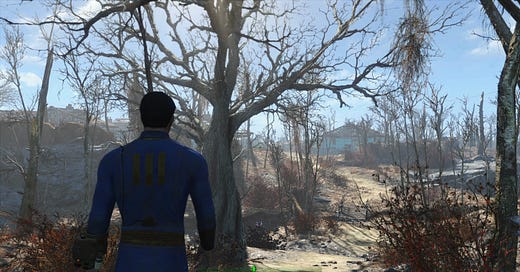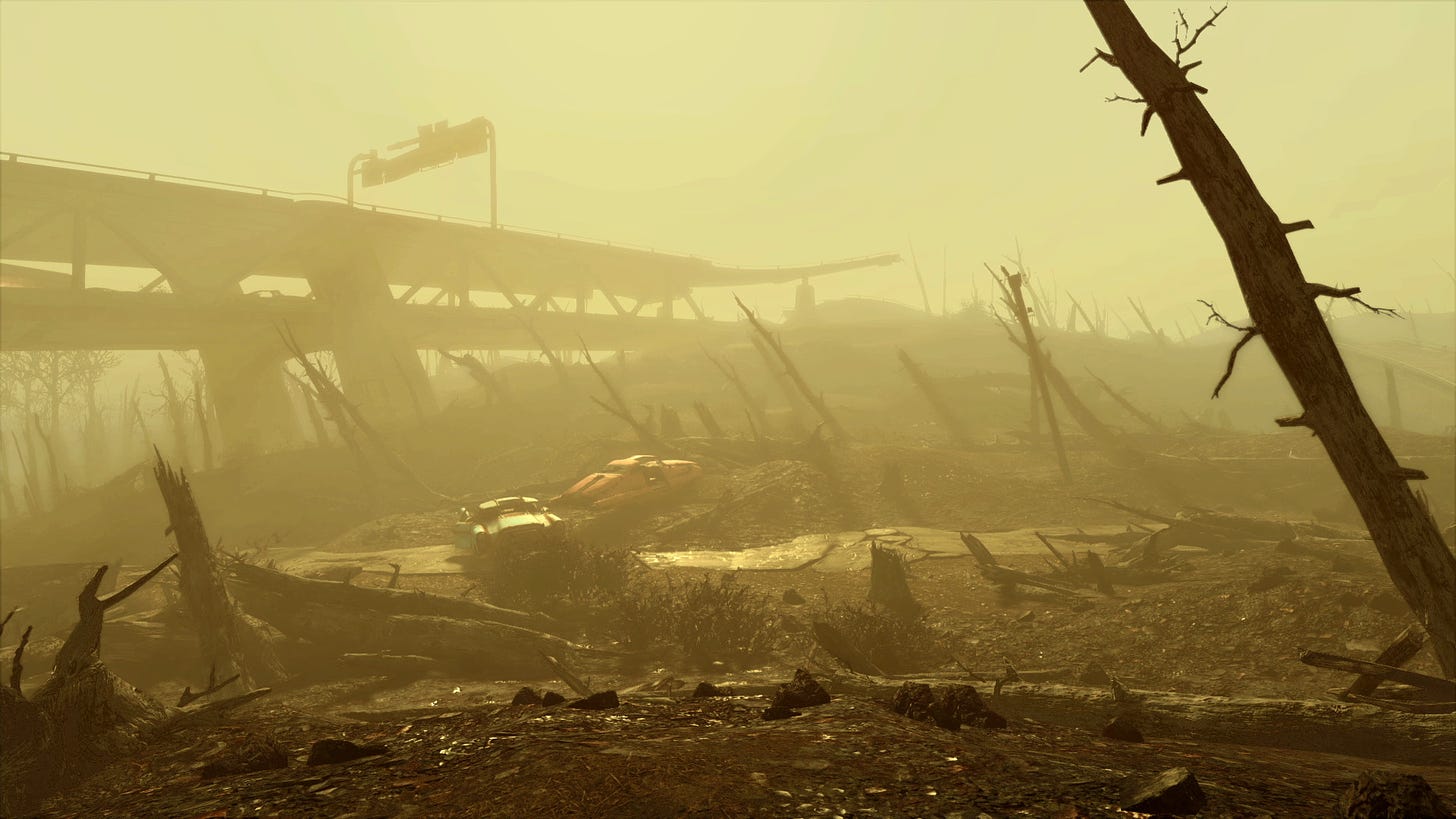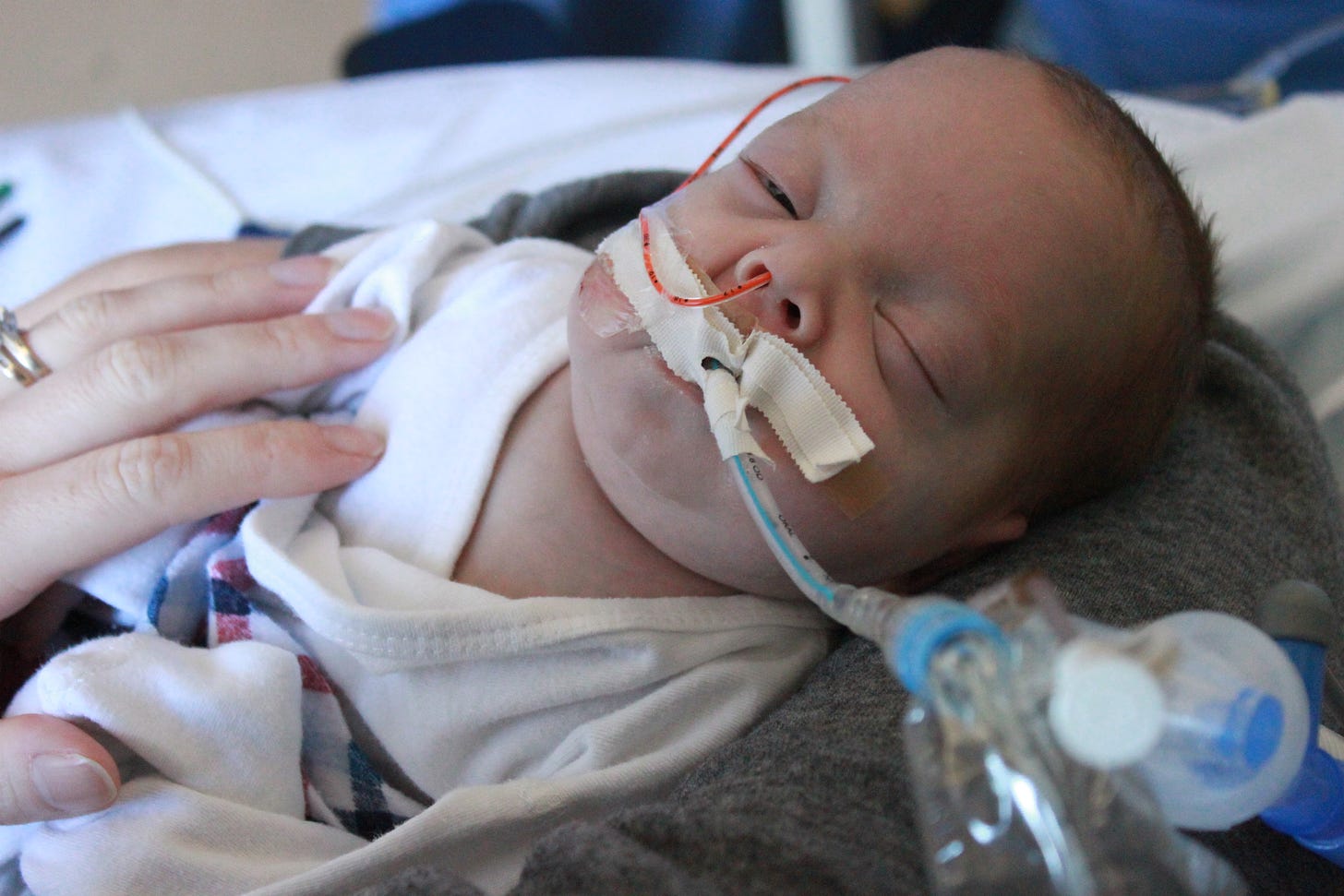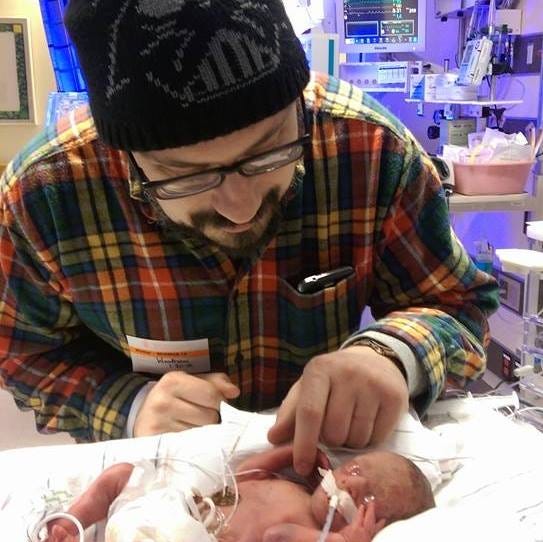The Fallout of Grief
Mike Woodham shares an intimate and devastating story about the loss of a child, and what a video game taught him about trying to move forward.
Hi all, I’m on vacation this week, but I’m pleased to present two guest posts while I’m on the beach with family. I’m open to more pitches at Crossplay, even from writers without bylines. I’m more interested in life experience than work experience. Drop me an email. -pk
CONTENT WARNING: The following is about the death of a child. In 2016, Mike Woodham became a father to his son, Wyatt Woodham. That same year, Wyatt tragically passed away. For years, Mike has been writing about his experiences with Wyatt’s death at his blog, and with Mike’s permission, we’ve re-printed this long essay about processing grief, and what it had to do with playing the game Fallout 4.
I started playing Fallout 4 a few days after Christmas in 2015. At the time, my wife was pregnant with our first son, who was due April 20th. We were also set to close on our first house in roughly two weeks. I had enjoyed Fallout 3, and was particularly excited for the latest installment since it took place in greater Boston, which is where we lived (albeit pre- apocalypse).
A few weeks later, my wife was in the hospital, fighting to keep our son in despite her body desperately wanting him out. We closed on our house while she was still confined to a hospital bed, getting routinely injected with magnesium sulfate to help stave off birth, which she described as having hot lava injected into her bloodstream. On January 20th, 2016, my son was born—three months early—and for the next four and a half months, Fallout, among many other things, would fall by the wayside as we did our best to navigate the complex medical needs of our firstborn as he fought to survive.
At the end of those four-and-a-half months, we would watch our son’s life slowly fade away in my wife’s arms, as we learned just how long an hour can really be. The hospital had arranged for a spread of sandwiches and accouterments, which was thoughtful, but we left as fast as we could and the food remained, untouched.
I guess that’s a luxury of living in pre-nuclear-apocalyptic times.
Fallout 4’s main story thrust is about a parent who, while frozen in a cryogenic chamber waiting out the nuclear apocalypse, watches helplessly as their partner gets killed and their son gets taken by mysterious ne’er-do-wells. I had already reached this point in the story by the time I had to put it down, which was just coincidence, really. It didn’t feel that way when I picked it back up a few months after we had walked home from the funeral parlor, carrying Wyatt’s ashes in a small metal cube roughly the size of a softball.
I’m a bit old school when it comes to RPGs, in that I try to earnestly role-play my character, even in moments when it seems silly or incongruent. This can be difficult in video games, as everything is pre-fabricated, including potential responses to a given situation or conversation. So when I picked back up with Fallout 4, I found myself in a position that was both exciting and terrifying–here I was, playing a character who had lost his son, as a man who had truly lost his son.
I made a conscious effort not to take it seriously, but I couldn’t shake this feeling that maybe this was my chance to exert some control over a situation that eerily mirrored my real life, where I had lost my son forever in the fog of chaos, grasping for control but always coming up empty handed. Perhaps I could regain something I had lost in the tragedy, even if it was only a fraction. Perhaps I would learn something. Perhaps it would…help.
I allowed myself to get lost in it—as I am wont to do—throughout the rest of the year. I found myself indulging in the open world, taking the scenic route more often than usual. Sure, I wasn’t averse to fast travel, but more often than not I would walk to my next destination, exploring, or trying to find in-game analogs for real-life locations (I think this is roughly where our apartment would be!). In the wake of my son’s death, I found a strange comfort in the world and environment of Fallout 4; the juxtaposition of post-nuclear devastation with the saccharine and superficial overtones of a culture that ultimately destroyed itself felt…right. Apropos.
Comfortable.
The fact that it took place in Boston certainly helped. What mattered was that this was a world that was vaguely recognizable, but decimated, filled with people just scraping by to survive. This was how I felt. A hollow man mechanically going through the motions of survival while ignoring the fact that everything around him seemed thin and tenuous and hopeless, surrounded by the crumbs of a world that promised perfection but was buried beneath the rubble of self-destruction and the actualized cynicism of nuclear…well, fallout. I bided my time building colonies and fighting mutants and Deathclaws and improving my power armor and upgrading my weapons and always in the back of my mind was the nagging thought that he’s dead. He’s dead. He’s dead. This thought haunted me daily in the course of my real life, but in the game, I could push it back with the clause of uncertainty. Sure, it had been hundreds of years since my digital son had been taken, but in the context of science fiction, anything is possible.
Luckily, there was no dearth of side quests, and it was easy to distract myself from the endgame with McGuffins and base camps and upgrades and companion missions. At least for a while, a long while. Eventually, though, there was only one way forward—I would have to chase my son.
The metagame also rang true, in its way, like the moments when my character would clip through the environment, reminding me that everything in this world was just a collection of hollow, externally animated amalgamations of polygons and textures, validating my feelings of cosmic tininess and futility. I no longer felt like some sort of unique, soulful being brought to life to fulfill my destiny. I felt like an empty and delicate shell, bouncing down through a pegboard without volition or power or influence. I was a Plinko chip, and while I would ultimately end up at the bottom, there may not be a prize at the end. Fallout 4 allowed me to indulge not only my cynicism, but my nihilism, and each ragdoll death animation brought a strange smile to my face. It not only helped me to forget about the hole in my heart for a while, but it indulged my new worldview, which was essentially that human effort was futile, and that we were all absolutely at the whim of a universe far too vast and complex for us to ever have a modicum of control over even the tiniest piece of it.
Except that, in a video game, you can save-scum your way through.
“Fallout 4 allowed me to indulge not only my cynicism, but my nihilism, and each ragdoll death animation brought a strange smile to my face. It not only helped me to forget about the hole in my heart for a while, but it indulged my new worldview, which was essentially that human effort was futile, and that we were all absolutely at the whim of a universe far too vast and complex for us to ever have a modicum of control over even the tiniest piece of it.”
Nonetheless, for whatever reason, I persisted, and eventually I found myself in the Institute, an evil organization that has been terrorizing the Commonwealth by kidnapping people and replacing them with robots. To this point, my understanding was that it was the Institute that had taken my son, Shaun. I found him, but he was not what I expected—not only was he a grown man, actually older than my character, but he was the mad scientist running the whole program.
I panicked. Quietly. I saved my game, and immediately shut it down.
There I was, finally having built up the courage to confront this strange metaphor I’d hoped would give me some small fragment of redemption, and instead the game was asking me if I would join him in his macabre mission, or fight him. I still have the save file from the moment this happened, which is dated December 30th, 2016, almost exactly a year after I had first started.
I forgot about the game for a long time. This wasn’t just some avoidant behavior brought on by trauma, though I imagine that had something to do with it. We had to try and rebuild our life, which included having a weird party with friends and family to celebrate Wyatt and everyone who helped us throughout his life, me going to a Modern Baseball show and getting weird and extremely sweaty in the mosh pit, and an incredible and eye-opening trip out West that helped us realize we could try again—and we did.
In June 2017, our son Rowan was born, happy and healthy and right on time.
Despite all this, Wyatt’s ghost followed closely.
Rowan’s birth brought an immense amount of joy back into our lives, but it didn’t exactly quell my grief for Wyatt. Pretty much every day, immediately after arriving at work, I would park my car in some dank, dark corner of the decaying parking garage outside our office, and cry. There was no trigger, really, it just became part of my morning routine. After three months, my wife returned to work, and I began my part-time paternity leave (with a lot of help from my mom, who covered baby duties when I had to work).
One thing I learned about babies is that you have to be entirely available to them at all times, because you never know when they’re going to be hungry, or need a diaper changed, or just want some love and attention. There is also a great deal of sleeping, however—at least there was for us—and the more I found myself sitting on the couch, staring at the baby and wondering if (hoping, praying) he would stay asleep for a while, the more I started thinking about getting in some game time while the getting was good.
Enough time had passed that I had forgotten where I’d left off in Fallout, but as soon as I laid eyes on the thumbnail for my most recent save, my heart started to implode. Right. My son might be an evil piece of shit. So I did what any brave father would do when confronted with such an existential conundrum—I ran and retreated into the soft, warm embrace of side missions for which I was wholly overpowered.
As I ran around the post-nuclear wasteland of greater Boston, I tried to lose myself in the immediate missions at hand–gathering supplies that those good-hearted settlers needed to grow enough food to live. Clearing out the bandit camps that were raiding honest, non-violent mutant farmers. Obtaining the parts necessary to modify my power armor for the next big fight. There was no going back, though.
Looming over everything was this enormous cloud of dread, the knowledge that all roads lead back to the Institute—and my son. People often reduce video games to a form of escapism, and there is certainly some truth in that, but here I was, trying to escape into a video game and yet encountering the same familiar cloud that seemed to follow me day in and day out, even when my PlayStation was off. A cloud that served as a constant reminder that my son was dead, and only a ghost remained.
In the context of Fallout, the ghost was the idea of the son I thought I was pursuing. In the context of my real life, it was something closer to a literal ghost. The ghost of a life that never was, the ghost of a life that could have been.
The ghost of a son I’d barely had.
I worried a lot about real life, at least internally. I worried that my grief for Wyatt would seep into my relationship with Rowan. I worried that Rowan would feel burdened by a hypothetical life he could never live up to, and grow to resent the brother he never really had. I worried that I would never really be okay, and that this would mean Rowan would never really be okay, and that I had somehow failed as a father before I had even finished the tutorial. Some days I worried that I would never escape Wyatt’s ghost, and other days I worried I would. I worried I would never know which was worse, and that, somehow, I would inevitably end up making the wrong choice.
I was running out of side quests in the game, but the ghost was louder than ever. I was tired; tired of waiting, of fighting, of slogging through a clockwork wasteland that would never force me to move forward and always provide plenty of Molerats and Deathclaws and raiders to hunt. I could play this game forever, time frozen in a way real life never could be; I could turn this game off and never look back, or I could just fucking get on with it already.
So I made my way back to the Institute, where Shaun was waiting, ready to repeat the same question verbatim that he’d posed months earlier—would I join him in his endeavors, or resist him? He would not allow for anything in between. How could I set out to kill my own son? After what I’d been through? Yet, how could I join an evil institution that treated the world at large as its own personal laboratory, with such casual disregard for the life that inhabited it? I stared at him, both my real self and my soulless avatar, contemplating my options, and it dawned on me—my hesitation was not borne of anything in-game, but rather because I was transposing Wyatt’s ghost onto Shaun’s digital model. I had made this game about Wyatt, just as I was making my relationship with Rowan about Wyatt, as I had been making my entire life about Wyatt. Everything I did, everything I saw was through the lens of his loss. My loss.
Somehow, this cheeky, cartoonish game about life after the end of the world had led me right to the slimy, hairy plug that was clogging up my existential drainpipe.
Not everything is about Wyatt, nor should it be. Something crystallized in my mind, and I felt like Scott Pilgrim after he earned the power of self-respect. Once Wyatt’s ghost retreated from my mind, I realized that I had been chasing a person that never existed, and would never exist. Nothing would ever change that, which meant my only option was to move forward, and grieve for what I had lost–hypothetical or not.
I think it goes without saying that Shaun and the Institute were fucked.
I, on the other hand, felt decidedly unfucked. Grief is never linear, and I still have my bad days, and probably always will, but they’re fewer and farther between. Most of the time I feel I can focus my energy where it needs to be–the life I still have, and sometimes that means Wyatt.
Thanks, in no small part, to Fallout 4.
Mike Woodham is a mental health professional and lifelong New York Giants fan who lives outside Boston with his wife and son. He enjoys weird music and TV, fantasy football, following F1 with his wife, watching his son pretend to be Ronaldo in the backyard, and playing video games right up until the last boss fight and then forgetting that they exist. When not doing those things, he dabbles in D&D and writing fiction and non-fiction. If you'd like to read more about his experiences with grief, you can read his blog.










Mike, thank you for sharing this. As a father, my heart was pounding reading this. I can't imagine what you went through, your strength is inspiring and I'm glad the Institute got fucked! Wish you and your family the best.
This was an incredible essay Mike. Thanks so much for sharing it with us